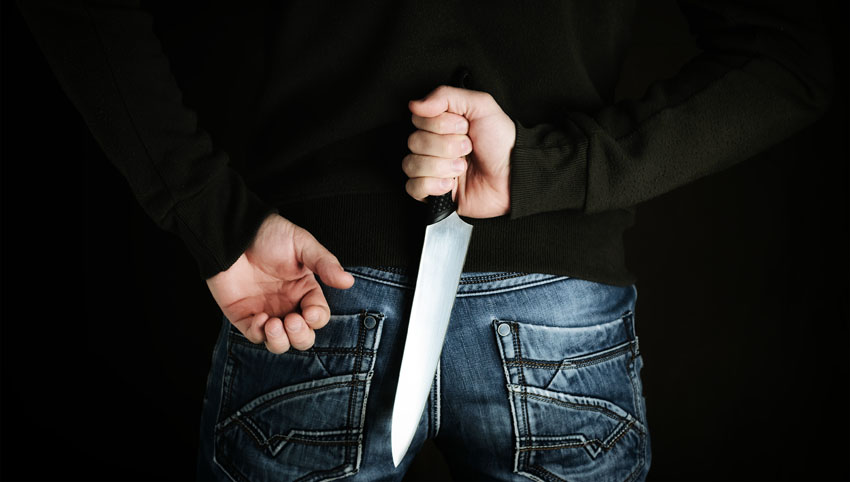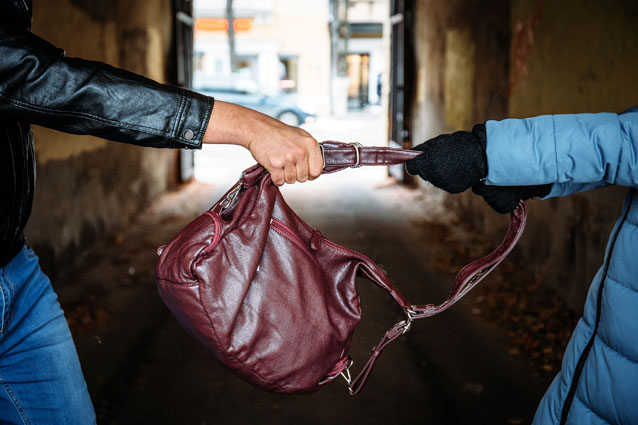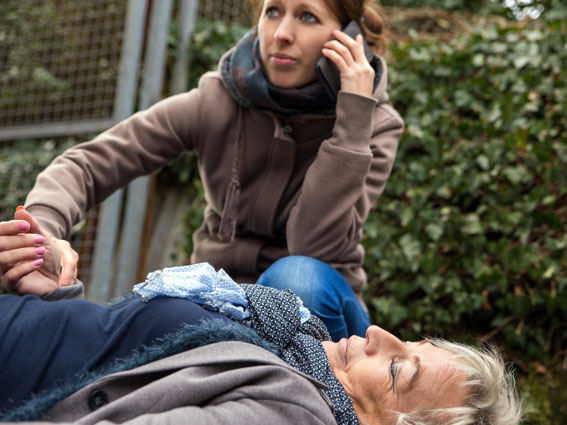10 expert tips on responding to knife attacks
There is no universal answer when faced with an armed attacker, but the following tips might increase your chances of survival in an emergency!
1. Mindfulness is all-important!
Most victims of attacks with bladed weapons are taken by surprise. All self-defence strategies and techniques will fail if you do not keep an attentive eye on your surroundings early on. Be wary of individuals who are behaving unusually, indicating that they are in a heightened emotional state – very agitated, nervous etc.
People who approach you and e.g. hide one hand behind their back or in a pocket might potentially be concealing a weapon which they intend to use on you.

2. On no account try to defend against a knife attack
Bladed weapons are often underestimated. They can cause injuries that are similar to or even worse than those from a firearm!
3. If threatened with a bladed weapon, it's better to hand over your money, mobile phone or valuables
 When the perpetrator has gone, call the police and let them do their job. Nothing material is so valuable that it's worth risking your health or life. The risk of being seriously injured or killed when attacked with a bladed weapon is far too high!
When the perpetrator has gone, call the police and let them do their job. Nothing material is so valuable that it's worth risking your health or life. The risk of being seriously injured or killed when attacked with a bladed weapon is far too high!
4. Deescalate!
Sometimes it helps to placate the potential attacker, appear to agree with him and use psychological techniques to deescalate the situation. Just as you learned during role-playing exercises in your EWTO self-defence classes. This is definitely better than playing the hero and trying to disarm the attacker with physical force.
5. Flight!
 If you recognise a potential attack with a knife, you are well advised to increase your distance from the attacker, run away, not get out of your locked car, or put something between you and the attacker – e.g. walk around a table or something similar.
If you recognise a potential attack with a knife, you are well advised to increase your distance from the attacker, run away, not get out of your locked car, or put something between you and the attacker – e.g. walk around a table or something similar.
This is the best advice in situations where your intuition, your common sense, warns you of potential danger. If someone appears suspicious to you on your way to the station, cross to the other side of the road. If somebody is behaving strangely, give him a wide berth. If you see a group of men that appears to be aggressive, avoid a direct encounter.
6. Use everyday items as improvised weapons
If there is no means of escape and the above alternatives are not available, your last resort is to use weapons of your own to defend yourself. These weapons can also be everyday items that everybody carries: mobile phone, umbrella, a kubotan (short metal or wooden stick) as a keychain or the bunch of keys itself, ballpoint pen, a plastic drinks bottle …
However, it has to be said that handling such improvised weapons for self-defence requires professional instruction and training!
7. Avoid trying play the hero!
If you witness a knife attack, the risk of being seriously injured if you try to help somebody who is being attacked with a knife by directly intervening is extremely high. You can only assess the situation realistically, and possibly intervene, if you are very well prepared for such situations, which requires long and regular training. Otherwise the same applies:
Keep your distance and call the police emergency number.
 8. Give First-Aid
8. Give First-Aid
What should you do in a situation where somebody has been attacked with a knife and injured? Give First-Aid immediately, and call the emergency number to summon paramedics and the police. If your First-Aid skills are somewhat rusty, make the emergency call at once! The sooner the injured person receives professional medical care, the better the chances of survival!
9. Don't leave sharp or dangerous objects lying around
 Attacks with bladed weapons in the workplace are becoming increasingly frequent. They happen in government offices, hospitals etc. Frustrated claimants, customers, patients grab scissors or a letter-opener that is lying around on a desk and stab someone with it.
Attacks with bladed weapons in the workplace are becoming increasingly frequent. They happen in government offices, hospitals etc. Frustrated claimants, customers, patients grab scissors or a letter-opener that is lying around on a desk and stab someone with it.
Emergency personnel such as firefighters or paramedics also come under attack increasingly often. Only mindfulness helps in these cases. If in doubt, retreat and call the police.
10. Counter fear with strength
The more self-assured you are in your daily life, the more you will be aware of your own strength in a dangerous situation.
If your friends, relatives or acquaintances want to know more on this subject, the EWTO was holding "Self-defence days" with informative beginner's courses in all of its schools starting on Saturday, 2nd February. On that day they are specifically for women! Naturally EWTO school owners are also available to anyone seeking advice on any other teaching day.
Your Oliver König
Photos: Adobe Stock: Brian Jackson, DedMityay, Cara-Foto, Dörr & M. Frommherz, Tiramisu Studio/aw


